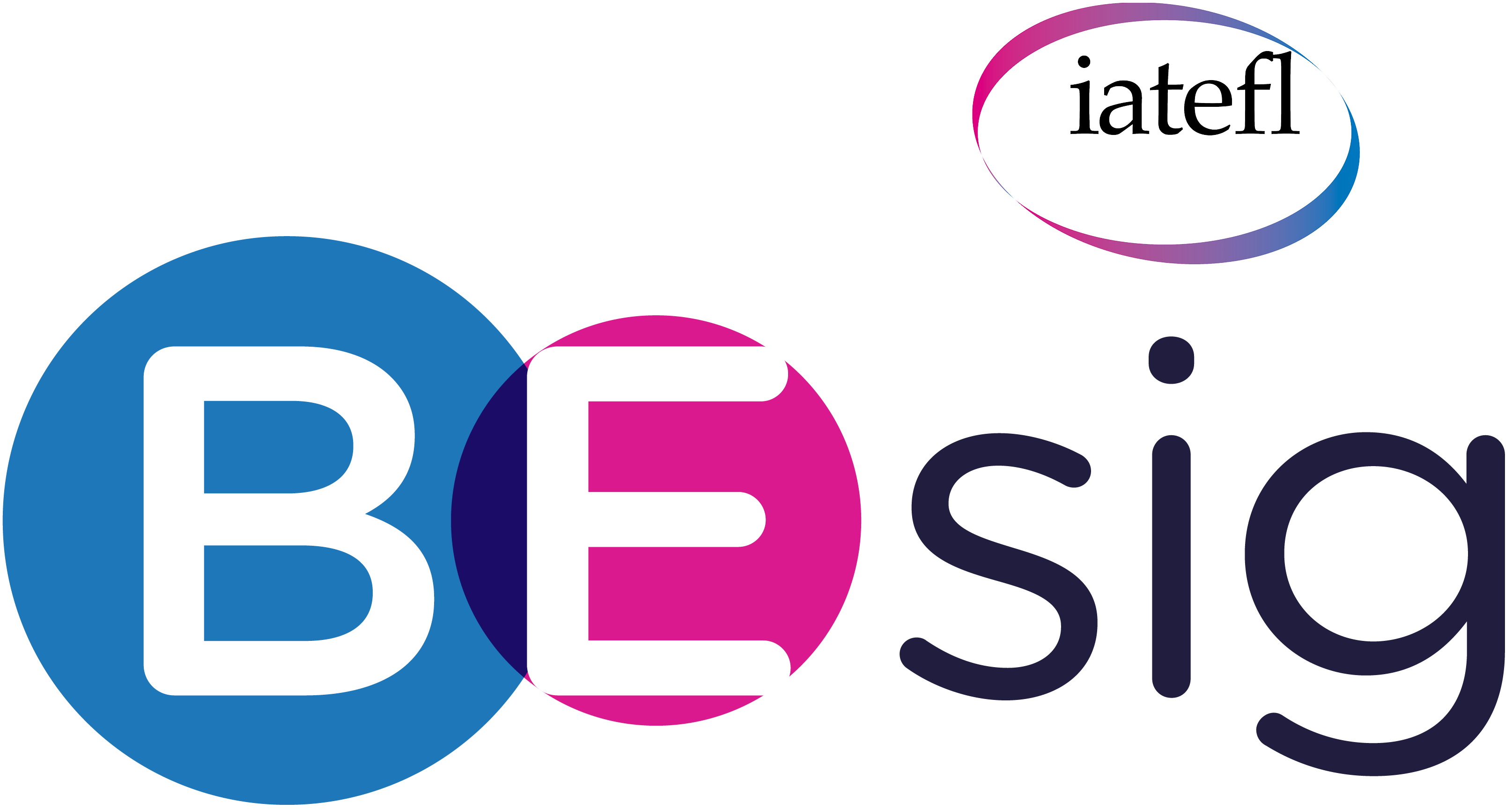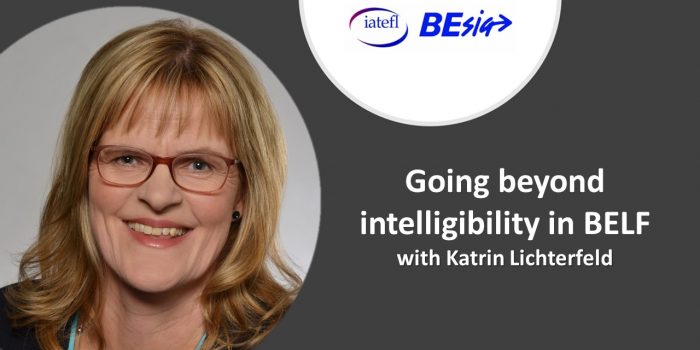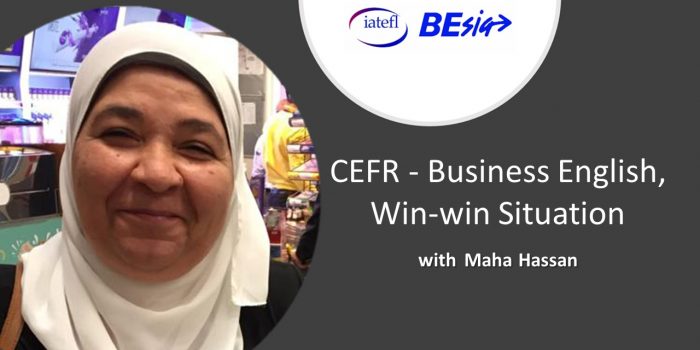
Julia Koifman
Welcome back readers! This week, we meet Julia, a teacher/presenter with a background in special educational need (SEN)s. Read on to find out Julia’s tips on teaching SEN business English students and students with dyslexia, and, of course, her personal favourite memories of BESIG.
Bio: I hold an MA degree, a certification of a remedial teacher and CELTA. I am based in Israel where I teach in school and conduct in-service courses of Business English. Some participants have learning disabilities, so I adapt my lessons to their needs. I am a member of some SIGs.
Tell us about why you joined BESIG and how you benefit from your membership.
In 2015 I gave a presentation at the 49th IATEFL conference in Manchester. It was my first international conference and I was lucky to meet Marjorie Rosenberg, Evan Frendo and other colleagues from all over the world who told me about BESIG. I decided to join it because I taught Business English and wanted to learn more about it. Since then I have attended some conferences in Europe and in 2017 I won a scholarship. Participating in BESIG has benefited me a lot because I learned how to teach in-service students better and to prevent people with learning disabilities from dropping out. When I attended the last conference in Berlin, I gave my first BESIG presentation. I shared my experience in teaching Business English in heterogeneous and inclusive groups.
What challenges have you seen in dyslexic students?
I started work in a SEN (special education needs) school in 2006, where I still work. I realized that I was good at teaching kids with specific educational needs, and in 2009 I became the English Coordinator at our school. A year later I started teaching Business English and I have always had adult students with learning disabilities.
Both teenagers and adults often get frustrated and want to drop out. Therefore, I need to be creative: to combine inclusive practices and different ways of teaching Business English so that they will be interested and motivated. Sometimes I have to differentiate tasks and prepare the materials of 2-3 levels. The struggling students do easier tasks and the other students do more complicated ones. Anyway, all of them need to be involved in speaking activities in order to make progress and to believe in themselves.
Could you give us some advice on how to include dyslexic students more in our classes?
Many dyslexic students are visual learners, so you should use eye-catching materials such as textbooks with pictures and highlighted vocabulary. Moreover, I often conduct video lessons. In my classes, teenagers and adults with any learning disability and level of knowledge are engaged in collaborative projects; their learning becomes the result of released creative power, involvement and participation in a positive and motivating environment where teachers become partners and assistants rather than instructors. Besides that, you should keep in mind that you might have auditory and kinesthetic learners as well. Therefore, use films, songs and other activities that help them memorize how the words and grammar constructions sound. Furthermore, kinesthetic learners like moving activities, such as role-playing, mapping and creating diagrams, which motivates them to describe the figures using business vocabulary. If you teach a heterogeneous group, differentiate tasks in accordance with the students’ levels.
Where, who and what do you teach?
I have two positions. In the morning I teach teenagers with special education needs (SEN). I am an English coordinator and I am responsible for planning the program for the school year in accordance with the national curriculum. I teach in high school and prepare students for the final exams. Mainly I teach them general English so that they will gain the level B2 or C1, finish school and go to university.
In the afternoon I am self-employed and teach an in-service course in a college. My students work as accountants, engineers, hotel workers or hold their own businesses. All of them need to improve their English to be able to have telephone conversations, write emails and reports, and conduct negotiations. Some of them speak English quite well but have severe problems with writing.
What tips could you give teachers or students who wish to relocate to Israel?
English is a compulsory subject in Israel and good teachers are in great demand. Nevertheless, they need to take very challenging courses for immigrant teachers and to pass rather difficult exams. But it is worthwhile work because it enables them to teach everywhere, from kindergarten to university. Moreover, Israeli citizens who want to get good jobs need to have a good command in English; thus many of them take private lessons or attend courses. Israel is a country with a highly developed hi-tech industry and its workers take in-service courses in order not to forget what they studied in school and university. Those who do not have a higher education diploma and own their own shops, restaurants and other small businesses are also motivated to speak English fluently because tourists from all over the world visit Israel all year round.
What would you say have been some changes in your career as a Business English teacher?
I have taught in the college for ten years and am still a regular Business English teacher. I do not want to be a principal because I prefer developing programs and teaching rather than being in charge of other teachers and students. Some years ago, I started attending IATEFL conferences and presenting and publishing articles both in teachers’ magazines and online. I attended BESIG conferences in Munich and Malta in 2016 and 2017 respectively but I did not present, so last year it was my first BESIG presentation in Berlin. I have never conducted a webinar about teaching Business English but I want to do it sometime.
Tell us about a fond BESIG memory.
Attending international conferences always benefits me professionally and personally. I listen to presentations and take notes. Many of the delegates have become my friends on Facebook. We are still in touch and exchange ideas regularly. Finally, I decided to share my own experience and prepared an interesting lecture about teaching Business English to students with learning disabilities. Giving a presentation at the BESIG conference in Berlin was the most memorable event. It was a great success because the room was full of people and they seemed to be interested in my topic, probably because it dealt with inclusive practices for adults. I am one of the ESL teachers who combines the methods of two IATEFL SIGs, the SEN and the BESIG.
There are different areas in the BESIG team where you can apply your skills. We could use help in designing the newsletter, organising events, and promoting scholarships, to mention a few. If you are interested in volunteering for BESIG, send an email to: [email protected]
Questions by Mandy Welfare
Editing by Mike Canning
25th April 2020
MEET A MEMBER is available to IATEFL BESIG members and non-members alike but only features our current members. Another reason to join us and “BE with BESIG.”



